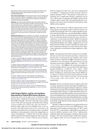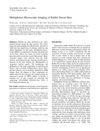 8 citations,
July 2012 in “Annals of biomedical engineering”
8 citations,
July 2012 in “Annals of biomedical engineering” Hair absorbs molecules differently based on their size, charge, and love for water, and less at higher pH; this can help make better hair products.
![Synthesis of Spiro[cyclohexane-1,2'-[2H]indene] Derivatives as Inhibitors of Steroid 5α-Reductase](/images/research/d91300a7-4d66-4d2c-90ac-293b0dbc5ff5/small/21048.jpg) 8 citations,
June 1995 in “Helvetica Chimica Acta”
8 citations,
June 1995 in “Helvetica Chimica Acta” Compound 15a was effective in inhibiting 5α-reductase.
 7 citations,
September 2014 in “European Journal of Dermatology”
7 citations,
September 2014 in “European Journal of Dermatology” Thicker hair grows faster; hair loss patients have slower growth.
 5 citations,
January 2020 in “Skin Research and Technology”
5 citations,
January 2020 in “Skin Research and Technology” Minoxidil 5% works better than 2% for hair growth in male-patterned hair loss.
 5 citations,
May 2008 in “Pediatric Diabetes”
5 citations,
May 2008 in “Pediatric Diabetes” Low-glycemic index diets are beneficial for weight loss and satiety, but more research is needed on long-term effects and individualized approaches are recommended.
 4 citations,
January 2016 in “JAMA Dermatology”
4 citations,
January 2016 in “JAMA Dermatology” Compression therapy improved ankle movement, reduced leg swelling, and lessened pain in patients with venous leg ulcers.
 2 citations,
September 2018 in “Tissue Engineering Part A”
2 citations,
September 2018 in “Tissue Engineering Part A” Xeno-free three-dimensional stem cell masses are safe and effective for improving blood flow and tissue repair in limb ischemia.
 2 citations,
January 1994 in “Yakubutsu dōtai”
2 citations,
January 1994 in “Yakubutsu dōtai” Finasteride has different absorption and metabolism in male and female rats, with higher concentrations in certain organs and mostly excreted through feces.
 1 citations,
December 2014 in “Scanning”
1 citations,
December 2014 in “Scanning” Multiphoton microscopy effectively images rabbit skin structures in detail without staining and shows differences from human skin.
 December 2016 in “The Journal of Sexual Medicine”
December 2016 in “The Journal of Sexual Medicine” Finasteride for hair loss may cause erectile dysfunction due to tissue fibrosis, and various factors contribute to female sexual dysfunction.
5 citations,
January 1994 in “PubMed”  December 2022 in “한국 미생물 생명공학회지”
December 2022 in “한국 미생물 생명공학회지” TS-SCLF from fermented Schisandra chinensis may promote hair growth and improve hair quality.
75 citations,
February 2017 in “Aging” SkQ1 antioxidant improved health and lifespan in mice.
 1 citations,
March 2024 in “Journal of Cellular and Molecular Medicine”
1 citations,
March 2024 in “Journal of Cellular and Molecular Medicine” 4-octyl itaconate may prevent hearing loss caused by the drug cisplatin by activating certain cell protection pathways.
 August 2023 in “Micromachines”
August 2023 in “Micromachines” The new method can create hair follicle-like structures but not complete hair with roots and shafts, needing more improvement.
 October 2022 in “Legume Research”
October 2022 in “Legume Research” The research found a way to grow plant tissue and analyze compounds in Bituminaria bituminosa, which is promising for hair restoration treatments.
August 2022 in “Biomedicines” Turning off the Lhx2 gene in mouse embryos leads to slower wound healing and scars.


![Synthesis of Spiro[cyclohexane-1,2'-[2H]indene] Derivatives as Inhibitors of Steroid 5α-Reductase](/images/research/d91300a7-4d66-4d2c-90ac-293b0dbc5ff5/small/21048.jpg)











